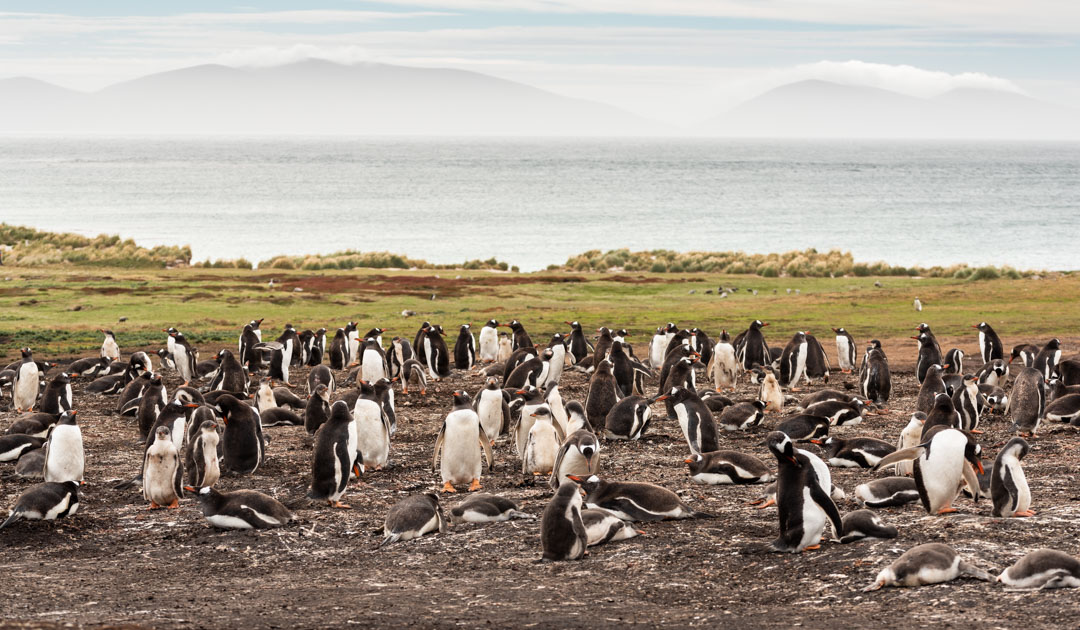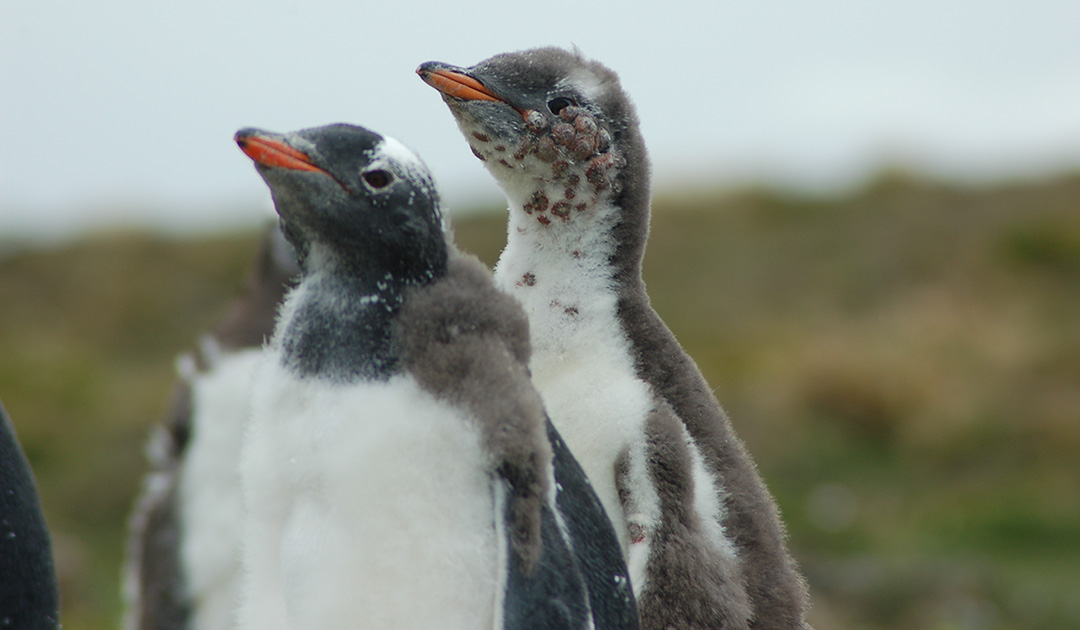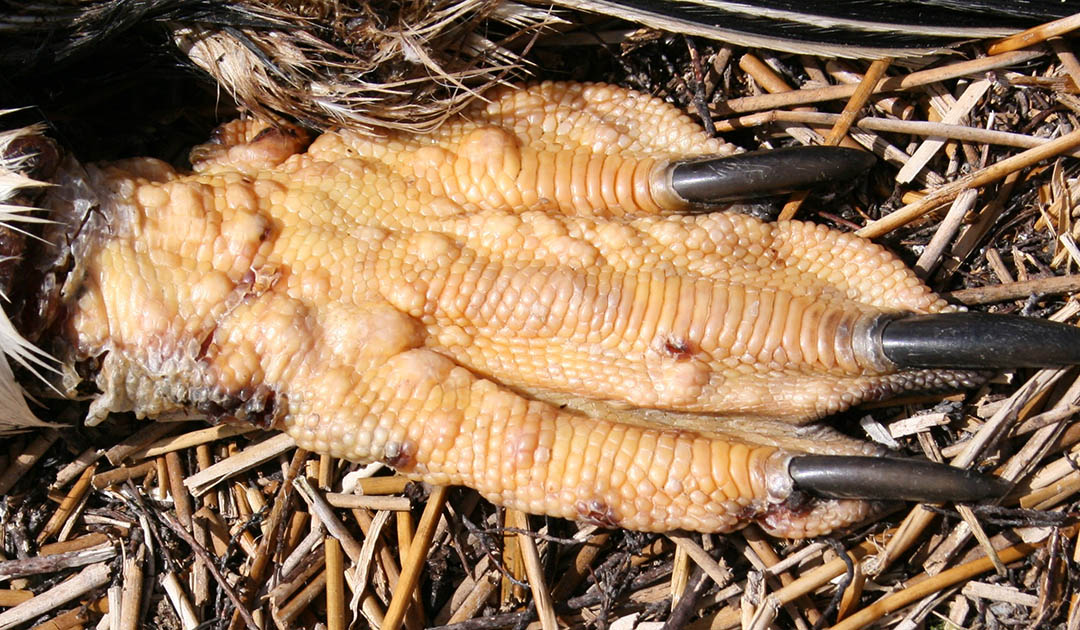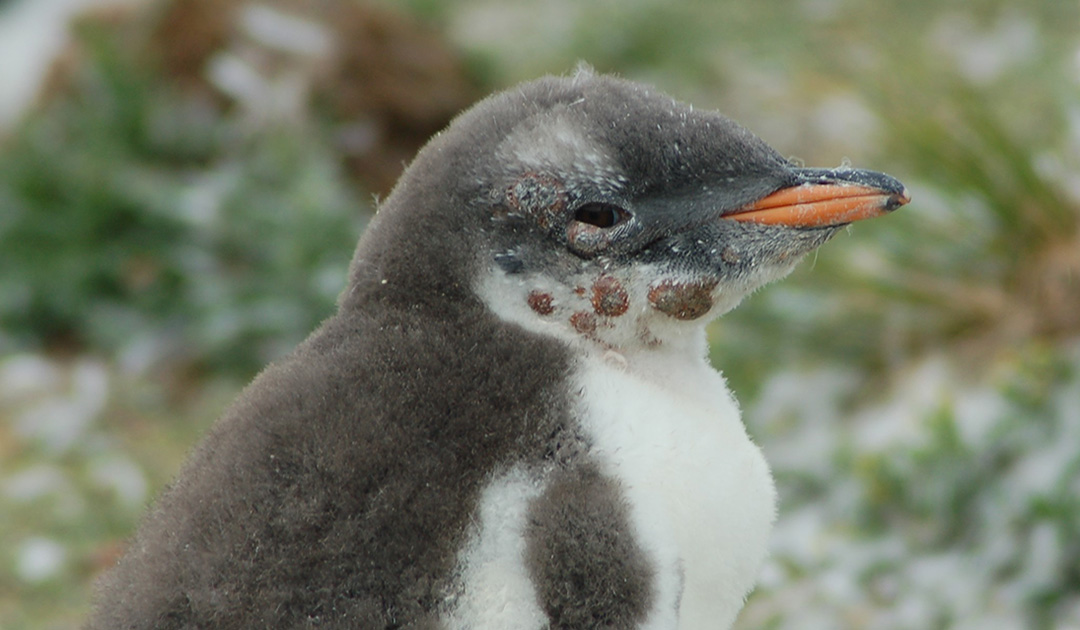
Wildlife diseases do not stop at remote islands. This is especially true for diseases that affect seabirds. Many of them transport pathogens over long distances from one region to another. The Falkland Islands in the South Atlantic, with their numerous colonies of seabirds and penguins, are not exempt. Currently, there is an outbreak of avian pox in one Gentoo penguin colony on the east coast, the Veterinary Service of the Falkland Islands Department of Agriculture announced last week, and appropriate measures have been taken to prevent the spread of the virus.
Avian pox is the most commonly reported disease observed in seabirds in the Falkland Islands, according to Falklands Conservation. The pathogens are strains of avipox virus, which can infect both wild and domestic birds. In the Falkland Islands, there are recurrent outbreaks, especially among Gentoo penguins.
“Avian Pox is endemic in the Falklands and outbreaks in a specific colony or adjacent colonies in a small geographical range would be expected from time to time every few years. It is a natural occurrence,” Grant Munro, Sites Officer at Falklands Conservation, tells PolarJournal.
Munro goes on to explain that an undetermined number of adult penguins have already been exposed to the virus, so there is a certain level of natural immunity. The virus therefore spreads especially among the chicks of the current year, which have not yet come into contact with the virus and are exposed to a high virus load because of the fairly close contact with each other. In addition, secondary infections of the lesions by bacteria may also occur, further weakening the chicks and usually leading to death.



Overall, older chicks seem to be most affected. Amandine Gamble, a wildlife disease scientist in the School of Biodiversity, One Health and Veterinary Medicine at the University of Glasgow and in the Department of Public and Ecosystem Health at Cornell University, USA, adds that in addition to adult birds, young chicks may also be immune through maternal antibodies.
It is not yet known how many of the adult Gentoo penguins carry antibodies to the avipox virus. Such a study would not be easy to conduct because blood samples are needed for antibody determination, as explained by Gamble, who is currently a visiting scientist in the Falkland Islands conducting research. In general, very little is known about wildlife diseases in the Falkland Islands, which is why Amandine Gamble began her research there.
According to Munro, the current outbreak is largely confined to this year’s chicks, so breeding success in the affected colony is likely to be low, but this should not affect the overall population of the long-lived penguins. Since adults are rarely affected, they will simply breed again the next year, Gamble said. However, if the outbreaks become more frequent, or if climate change impacts further weaken the animals, this could well affect the population dynamics of the penguins.

“It is not uncommon for chicks to fail late in the season and in a weaker state avian pox is another stressor – especially if there is secondary bacterial infection of lesions,” Munro says. “In healthy adults the level of mortality is probably low (we don’t have exact figures and difficult to know what happens to individual birds or birds at sea) and they have the option to abandon breeding, hence mortality is higher in the chicks. Chicks that survive will however retain a level of natural immunity.”
What triggers the periodic outbreaks of avian pox has not yet been determined. However, the virus is thought to be transmitted by insects such as mosquitoes or fleas, and it appears that outbreaks may be favored by certain climatic events. In the Falkland Islands, fleas in penguin colonies may be primarily responsible for bird-to-bird spread, Gamble explained.
“Why a given colony is affected a given year remains a mystery. This is something I’d like to investigate in collaboration with the local community – the island owners, the conservation officers, the vets, etc… – who are the ones ‘in the field’ observing the outbreaks,” Gamble says. “The idea would be the create a data base of avian pox outbreaks, which could be used after a few years of data collection to look at the environmental factors associated with the occurrence of the virus. Are outbreaks associated with specific climatic conditions? The presence of other species? The presence of humans? Etc…”

For now, the outbreak is confined to this one colony and both the authorities and Falklands Conservation have put measures in place to minimize the likelihood of transmission to other colonies. For example, according to Munro, visiting the affected colony is currently not allowed because the viruses can be carried on with shoes, with clothing, with walking sticks or tripods. Falklands Conservation, the Environment and Veterinary Services are therefore calling for boots, clothing and equipment to be thoroughly cleaned between sites. In addition, disinfecting shoe baths have been installed at all Falkland Islands Government Air Service (FIGAS) airfields, as well as at the main tourist sites.
Other penguin and seabird species, such as Rockhopper penguins and Black-browed albatrosses, can also be affected by avian pox, but have not yet been affected this year. For these species, an outbreak may have more severe consequences than for Gentoo penguins, as breeding success of Rockhopper penguins in particular is generally lower and they are already struggling with the effects of climate change.
Julia Hager, PolarJournal
More about this topic:





